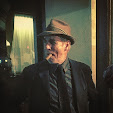Sweat
Sweat is the salty gloss of persistence.
The trout-like sheen of stamina.
Sweat is the condensation of toil.
The slick evidence of will. *
And now for the seamy details:
Sweat Management.
In the course of doing the clown acts in Kooza there will be sweat.
It doesn’t matter if it’s a Minnesota Matinee with 30% of the big top filled or a maximum capacity Vancouver crowd pumping energy back across the footlights at us. Doing the act makes me sweat profusely.
This is not to be confused with Flop Sweat. The chilly, unearned sweat that comes from some internal furnace of anxiety and is more a sign of mental turmoil than actual physical exertion. I’ve had that too, but this is different.
T
 he costume department does what it can. Under my various costumes I wear t-shirts of a futuristic wicking (wiccan?) material. The latest ones have a hole over the left pectoral (fittingly directly over my heart) where I’ve cut the plastic emblem off because it was irritating my skin.
he costume department does what it can. Under my various costumes I wear t-shirts of a futuristic wicking (wiccan?) material. The latest ones have a hole over the left pectoral (fittingly directly over my heart) where I’ve cut the plastic emblem off because it was irritating my skin.
I am also given a small black terrycloth rag to mop my brow between entrances.
I can’t really mop my brow.
I must dab.
I’m not about to ruin the hour and a half worth of make up I have painstakingly applied to my mug.
Of course the make up (with lots of touch ups) remains intact through all the sweating. It doesn’t melt off because I’m using the same products Cirque uses for the performers in O in Las Vegas and that show is mostly underwater.
So sweat is part of my daily routine and I’ve learned to accept it as a fact of clowning life.
Raise your hand if you're sure.
In Praise of Sweat
Our director, David Shiner is reported to have said he never thought much of a clown that didn’t sweat. I’m a sweater by metabolism anyway so I’m inclined to think the same way.
Sweat has a way of reminding us of our animal.
When you’re looking across the stage and a stinging drop falls from its perch on the waxed curlicue of your overgrown eyebrow and lands with a salty splash directly on your retina, staggering in momentary myopia, you know, at least, you’re giving your all.
In fact some of the workshops I was giving at the Berkeley Rep I entitled Theatre of Sweat. I was interested in seeing acting as an aerobic activity.
Sweat tells us that the stakes are high enough to engage the organism fully.
The Drip Factor
I remember a press conference in Tel Aviv when I was doing
The Thousandth Night at the International Teattronetto.
Steven Berkoff and I were seated together at the event. We got into a conversation about the relative physicality of our respective one man shows.
(He was doing his piece about Shakespeare’s villains at the time.)
He fixed
 me at one point with those impossibly piercing eyes and said “When I do my show the sweat comes off my chin like this: Drip. Drip. Drip.”
me at one point with those impossibly piercing eyes and said “When I do my show the sweat comes off my chin like this: Drip. Drip. Drip.”
I responded that when I do my show the sweat comes off my chin like this: Drip-Drip-Drip-Drip-Drip, doubling the time signature.
It was harmless actor posturing but it’s true: perspiration is a salty by-product of performance and the reality of it must be dealt with.
The same goes for saliva management.
This usually comes into play when tackling the more verbal challenges of Shakespearean roles and one man shows where sometimes you have to chart not only where you have to take your breaths but where to swallow all the extra saliva your jabbering is producing.
Seamy Details
The art of dealing with your own sweat onstage without bringing any undo attention to it, without betraying any sense of labor or effort while you’re sweating buckets and all the while adhering to the maxim of “Don’t Let Them See You Sweat” is just another one of the seamy details you encounter when in search of the Mask of Satori.




No comments:
Post a Comment